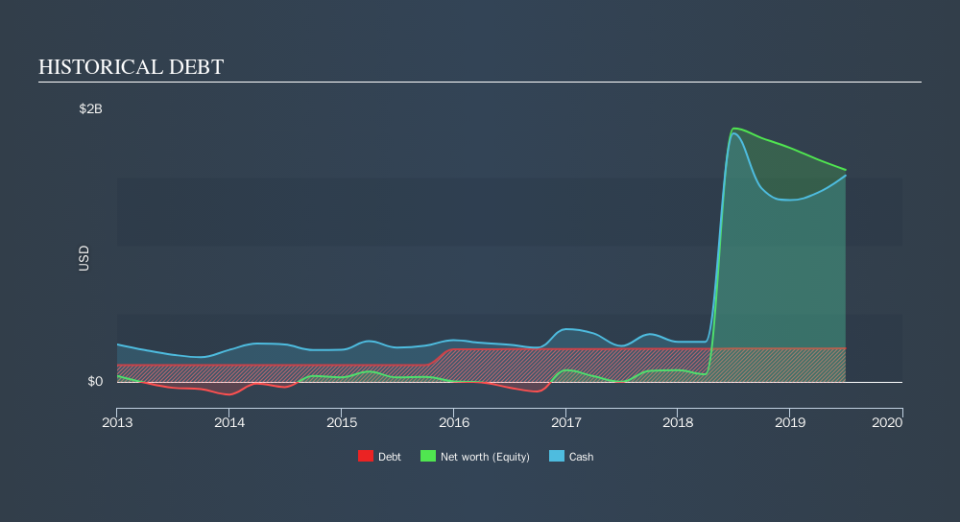Does Nektar Therapeutics (NASDAQ:NKTR) Have A Healthy Balance Sheet?

David Iben put it well when he said, 'Volatility is not a risk we care about. What we care about is avoiding the permanent loss of capital. So it seems the smart money knows that debt - which is usually involved in bankruptcies - is a very important factor, when you assess how risky a company is. We note that Nektar Therapeutics (NASDAQ:NKTR) does have debt on its balance sheet. But should shareholders be worried about its use of debt?
When Is Debt Dangerous?
Debt and other liabilities become risky for a business when it cannot easily fulfill those obligations, either with free cash flow or by raising capital at an attractive price. Part and parcel of capitalism is the process of 'creative destruction' where failed businesses are mercilessly liquidated by their bankers. However, a more common (but still painful) scenario is that it has to raise new equity capital at a low price, thus permanently diluting shareholders. Of course, plenty of companies use debt to fund growth, without any negative consequences. The first step when considering a company's debt levels is to consider its cash and debt together.
View our latest analysis for Nektar Therapeutics
What Is Nektar Therapeutics's Net Debt?
The chart below, which you can click on for greater detail, shows that Nektar Therapeutics had US$247.8m in debt in June 2019; about the same as the year before. But it also has US$1.52b in cash to offset that, meaning it has US$1.27b net cash.
How Healthy Is Nektar Therapeutics's Balance Sheet?
According to the last reported balance sheet, Nektar Therapeutics had liabilities of US$113.4m due within 12 months, and liabilities of US$429.1m due beyond 12 months. Offsetting this, it had US$1.52b in cash and US$37.3m in receivables that were due within 12 months. So it can boast US$1.01b more liquid assets than total liabilities.
This surplus strongly suggests that Nektar Therapeutics has a rock-solid balance sheet (and the debt is of no concern whatsoever). With this in mind one could posit that its balance sheet is as strong as beautiful a rare rhino. Succinctly put, Nektar Therapeutics boasts net cash, so it's fair to say it does not have a heavy debt load! There's no doubt that we learn most about debt from the balance sheet. But it is future earnings, more than anything, that will determine Nektar Therapeutics's ability to maintain a healthy balance sheet going forward. So if you want to see what the professionals think, you might find this free report on analyst profit forecasts to be interesting.
Over 12 months, Nektar Therapeutics made a loss at the EBIT level, and saw its revenue drop to US$119m, which is a fall of 91%. That makes us nervous, to say the least.
So How Risky Is Nektar Therapeutics?
We have no doubt that loss making companies are, in general, riskier than profitable ones. And the fact is that over the last twelve months Nektar Therapeutics lost money at the earnings before interest and tax (EBIT) line. Indeed, in that time it burnt through US$352m of cash and made a loss of US$423m. But the saving grace is the US$1.27b on the balance sheet. That means it could keep spending at its current rate for more than two years. Even though its balance sheet seems sufficiently liquid, debt always makes us a little nervous if a company doesn't produce free cash flow regularly. For riskier companies like Nektar Therapeutics I always like to keep an eye on whether insiders are buying or selling. So click here if you want to find out for yourself.
At the end of the day, it's often better to focus on companies that are free from net debt. You can access our special list of such companies (all with a track record of profit growth). It's free.
We aim to bring you long-term focused research analysis driven by fundamental data. Note that our analysis may not factor in the latest price-sensitive company announcements or qualitative material.
If you spot an error that warrants correction, please contact the editor at editorial-team@simplywallst.com. This article by Simply Wall St is general in nature. It does not constitute a recommendation to buy or sell any stock, and does not take account of your objectives, or your financial situation. Simply Wall St has no position in the stocks mentioned. Thank you for reading.

 Yahoo Finance
Yahoo Finance 
